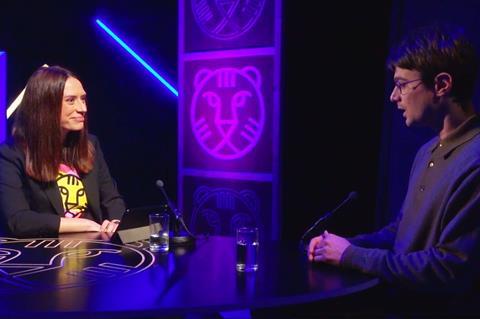
Filmmakers Paz Encina, Sam de Jong and Roee Rosen discussed the films they have screening in the Tiger competition and the means used to convey their message onscreen at a digital press conference held by the International Film Festival Rotterdam (IFFR) on Monday (January 31.)
Encina’s third feature film EAMI sees the Paraguayan director depict the violence committed against the Ayoreo-Totobiegosode indigenous people of Chaco, capturing a world that may soon be lost. The director said she only recently came to feel it her mission to tell their story to the world though had first been in contact with them thirty years ago.
“Exile, diaspora and loss were key concepts,” Encina said. “I let myself be carried along by what emerged, and the narrative was shaped as the dialogues unfolded.”
She immersed herself in their mythology and listened to testimonies about being chased off their land by corporate interests to create a magic-realist film. dreamy film centred on the life of a little girl whose existence is turned upside down after her village is destroyed and her community disintegrates.
“It’s a distinct, fairy-tale view of the world that envisages being able to talk to lizards, or plants being protective mothers,” Encina added. “They don’t think of time like we do, and I came to understand I had to think of it differently. Their space-time notion was particularly striking as it had a very transient feeling to it.”
The power of words are highlighted when a television presenter’s camera is stolen in Dutch director de Jong’s Met Mes. When the insurance company delays repayment and the police fail to take the report seriously, she is prompted to lie to attract attention to her plight, claiming to have been robbed at knife-point. Involving the word ‘knife’ changes the dynamics of the discourse and the knock-on effects have massive consequences for Yousef, the suspect in the investigation.
The filmmaker said this colourful visual of society’s more absurd sides is at heart a story of hypocrisy and stigmatisation. “We are showing a kid that is being ethnically profiled, and by making the movie we were contributing in this,” de Jong explained. “It was a dilemma we had to grapple with, and this resulted in stylisation that made the viewer constantly aware they were watching a movie and being actively manipulated.
”We made everything unnatural’ to the point that “the colour is sometimes painful to your eyes, but it was the only way to make the movie,” he said.
“It is a reflection on the power you have as a filmmaker.”
Israel’s Roee Rosen said he never consciously planned a political statement for Kafka For Kids. Yet the surreal and bizarre compilation of events, animation and movement that is a parody of a children’s TV show with a Kafka-esque overlay developed into a charged political monologue questioning how to best define a child. The concept of child is then related to a transitory state in occupied territory ruled by military law.
“I always thought there would be a political layer to the film, though it was not planned,” Rosen said.
Composer Igor Krutogolov created a heightened music score using only a toy orchestra that had only one key. “Music is substantial and foundational in a film, just as much as characters, aesthetics, structure,” said Rosen.






![The Brightest SunScreen[Courtesy HKIFF]](https://d1nslcd7m2225b.cloudfront.net/Pictures/274x183/3/5/0/1448350_thebrightestsunscreencourtesyhkiff_312678.jpg)


















No comments yet